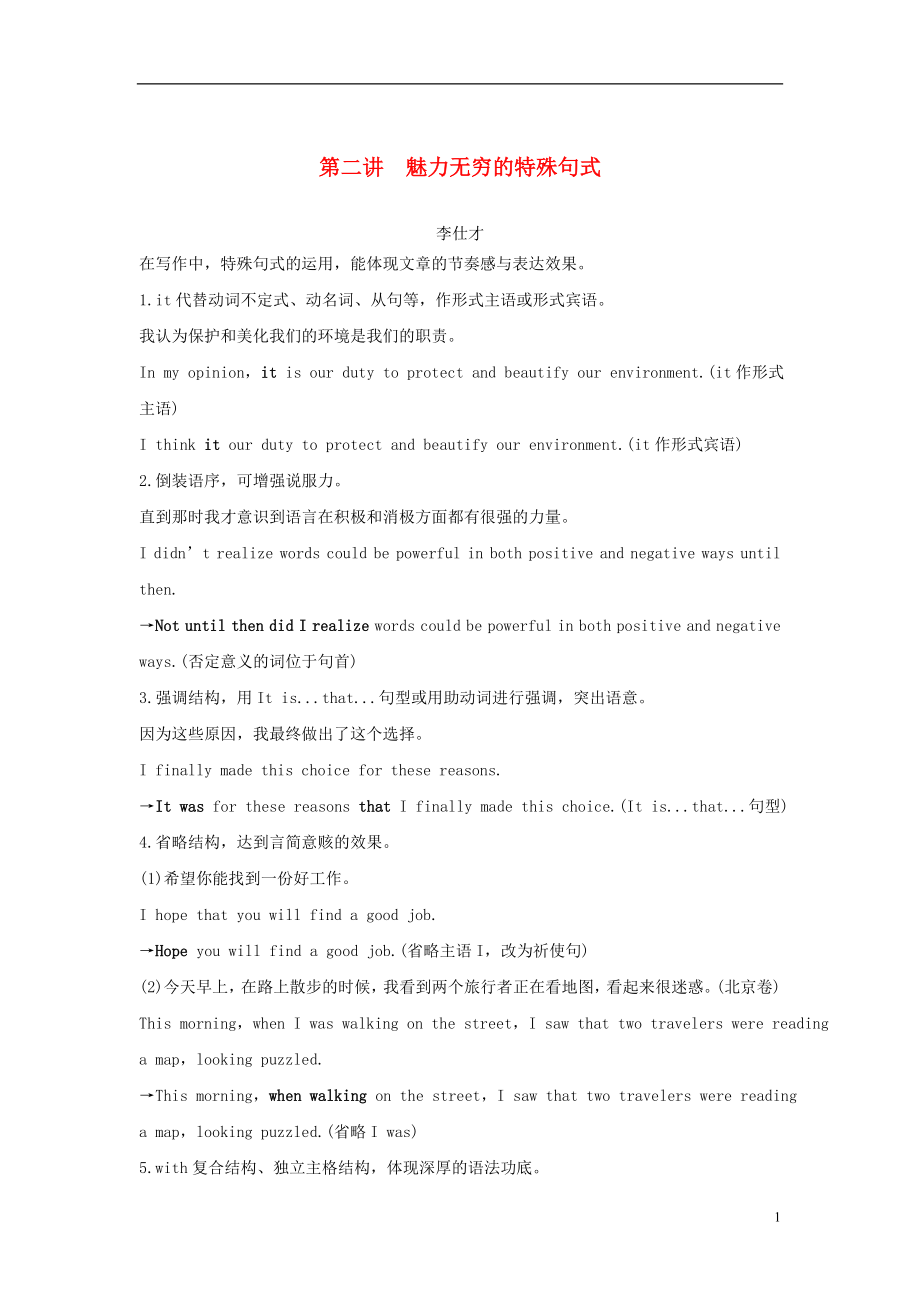《江蘇省2019高考英語 第三部分 寫作層級(jí)訓(xùn)練 第一步 循序漸進(jìn)提升寫作技能 第二講 魅力無窮的特殊句式(講解)》由會(huì)員分享,可在線閱讀����,更多相關(guān)《江蘇省2019高考英語 第三部分 寫作層級(jí)訓(xùn)練 第一步 循序漸進(jìn)提升寫作技能 第二講 魅力無窮的特殊句式(講解)(3頁珍藏版)》請(qǐng)?jiān)谘b配圖網(wǎng)上搜索。
1���、
第二講 魅力無窮的特殊句式
李仕才
在寫作中���,特殊句式的運(yùn)用,能體現(xiàn)文章的節(jié)奏感與表達(dá)效果�。
1.it代替動(dòng)詞不定式、動(dòng)名詞��、從句等�����,作形式主語或形式賓語��。
我認(rèn)為保護(hù)和美化我們的環(huán)境是我們的職責(zé)����。
In my opinion�,it is our duty to protect and beautify our environment.(it作形式主語)
I think it our duty to protect and beautify our environment.(it作形式賓語)
2.倒裝語序�����,可增強(qiáng)說服力���。
直到那時(shí)我才意識(shí)到語言在積極和消極方面都有很強(qiáng)的力量
2�����、�����。
I didn’t realize words could be powerful in both positive and negative ways until then.
→Not until then did I realize words could be powerful in both positive and negative ways.(否定意義的詞位于句首)
3.強(qiáng)調(diào)結(jié)構(gòu)�,用It is...that...句型或用助動(dòng)詞進(jìn)行強(qiáng)調(diào)��,突出語意�。
因?yàn)檫@些原因,我最終做出了這個(gè)選擇���。
I finally made this choice for these reason
3�����、s.
→It was for these reasons that I finally made this choice.(It is...that...句型)
4.省略結(jié)構(gòu)�����,達(dá)到言簡(jiǎn)意賅的效果����。
(1)希望你能找到一份好工作���。
I hope that you will find a good job.
→Hope you will find a good job.(省略主語I��,改為祈使句)
(2)今天早上����,在路上散步的時(shí)候��,我看到兩個(gè)旅行者正在看地圖�����,看起來很迷惑����。(北京卷)
This morning���,when I was walking on the street,I saw
4�����、 that two travelers were reading a map�,looking puzzled.
→This morning,when walking on the street�,I saw that two travelers were reading a map,looking puzzled.(省略I was)
5.with復(fù)合結(jié)構(gòu)����、獨(dú)立主格結(jié)構(gòu),體現(xiàn)深厚的語法功底����。
春天來臨,人們將開展各種各樣的活動(dòng)�。
When spring is drawing near,people will hold varieties of activities.
→With spri
5����、ng drawing near��,people will hold varieties of activities.(with復(fù)合結(jié)構(gòu))
6.祈使句�,引起讀者注意����。
如果你認(rèn)為你不能和父母談?wù)?���,你可以給他們寫一封信。
If you don’t think you can talk to your parents�����,you can write them a letter.
→If you don’t think you can talk to your parents���,write them a letter.(省略主語you����,改為祈使句)
7.感嘆句��,表示強(qiáng)調(diào)����。
現(xiàn)在我很高興���。
I a
6、m very delighted now.
→How delighted I am now!
8.“There be...”句型�,意思是“有”。
“There be...”句型其實(shí)是倒裝的一種情況����,主語位于謂語動(dòng)詞be之后,there僅為引導(dǎo)詞�����,并非實(shí)際主語���。真正的主語位于謂語動(dòng)詞be之后����。be與跟在后面的主語保持人稱和數(shù)量的一致����,有時(shí)態(tài)和情態(tài)變化。此句型有時(shí)不用be動(dòng)詞��,而用live�����,stand,come��,go���,lie����,remain����,exist��,arrive等�����。
There was only a well in the village.
這個(gè)村子過去只有一口井���。
There re
7����、mains a question still to be answered.
還有一個(gè)問題要回答。
In front of the cave�����,there stands a tall pine tree.
在這個(gè)山洞前長(zhǎng)著一棵高大的松樹�����。
There may be a bird on the branch.
樹枝上也許有一只鳥��。
[跟 蹤 訓(xùn) 練]
Ⅰ.改寫句子
1.I realized the importance of English when I entered senior high school.(強(qiáng)調(diào)時(shí)間狀語)
It__was__when__I__entered__
8��、senior__high__school__that__I__realized__the__importance__of__English.
2.We had a very good time with the peasants that day.(用what感嘆句)
What__a__good__time__we__had__with__the__peasants__that__day!
3.Because there was too much noise����,I couldn’t go on studying.(用with復(fù)合結(jié)構(gòu)作狀語)
With__too__much__noise_
9、_going__on�,I__couldn’t__go__on__studying.
Ⅱ.翻譯句子
1.我認(rèn)為,僅僅送給父母貴重的禮物是不對(duì)的���。
①I__don’t__think__it__right__to__give__parents__only__valuable__gifts.(it作形式賓語)
②In__my__opinion�,it__isn’t__right__to__give__parents__only__valuable__gifts.(it作形式主語)
2.他們所做的事給別人帶來了快樂����,也豐富了他們自己的生活�����。
Not__only__does__what__the
10�、y__do__bring__others__joy__but__also__enriches__their__own__lives.(倒裝句)
3.雖然來晚了�����,但是他并沒有挨批評(píng)��。
①Late__though/as__he__was�����,he__wasn’t__criticized.(倒裝句)
②Though__late��,he__wasn’t__criticized.(省略句)
4.客人當(dāng)中有兩名美國人和一名法國人�。
Among__the__guests__there__are__two__Americans__and__a__Frenchman.(there be結(jié)構(gòu))
3
 江蘇省2019高考英語 第三部分 寫作層級(jí)訓(xùn)練 第一步 循序漸進(jìn)提升寫作技能 第二講 魅力無窮的特殊句式(講解)
江蘇省2019高考英語 第三部分 寫作層級(jí)訓(xùn)練 第一步 循序漸進(jìn)提升寫作技能 第二講 魅力無窮的特殊句式(講解)

